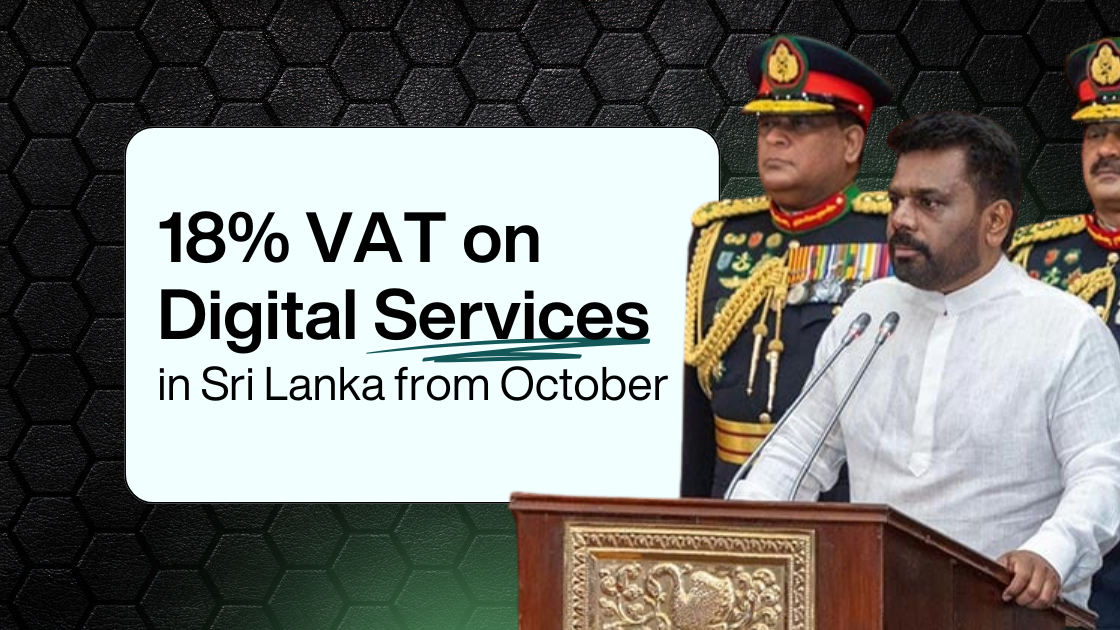
18% VAT on Digital Services in Sri Lanka
What the New 18% VAT on Digital Services in Sri Lanka Means for You (Starting October 2025)
I’ve noticed rising interest in the new 18% Value Added Tax (VAT) rule being enforced on digital services, starting on 1 October 2025. Many overseas providers wonder if this is a brand‑new tax, while Sri Lankan businesses worry about competitive impacts. I aim to break down everything clearly—what’s changing, who’s affected, and why it matters globally in the digital economy.
Background: Not a New Tax, Just Enforced Now
Let’s address the common misconception: “this isn’t new”, but it is finally being enforced. As Dr Anil Jayantha, Sri Lanka’s Deputy Minister of Economic Development, clarified:

“This is not a new tax … it’s part of the existing VAT Act. We’re simply enforcing it fairly across all providers.” Asian MirrorNewswire+5Newsfirst+5News First+5
Originally slated for April, legal delays pushed implementation to 1 October 2025. Now, the Inland Revenue Department (IRD) is moving forward under Gazette No. 2443/30, published on 1 July 2025 Gazette.lk+6KPMG+6Asian Mirror+6.
Legal Framework & Effective Date
- Governed by the Value Added Tax (Amendment) Act No. 04 of 2025, effective from 01 October 2025.
- The IRD issued Gazette Notification No. 2443/30 on 1 July 2025, detailing compliance guidelines KPMG+8Newswire+8Daily Mirror+8.
- Implementation applies to non‑resident providers supplying digital services to Sri Lankan consumers via electronic platforms regfollower.com+15Asian Mirror+15Ceylon Today+15.
Who Is Affected?
1. Non‑Resident Providers
This regime impacts any foreign digital service provider delivering services directly to consumers in Sri Lanka via electronic or digital platforms. Local providers were already VAT‑registered, but foreign suppliers have not been—until now Wikipedia+4Asian Mirror+4VATupdate+4.
2. Business-to-Consumer (B2C)
Mainly B2C services are in scope. While B2B transactions may use a reverse charge mechanism, the focus is on services consumed by Sri Lankan individuals or entities VATupdate+1vatcalc.com+1.
What Services Are Subject to 18% VAT?
The amendment covers a broad and inclusive list:
- Cloud computing: hosting, storage, computing power
- Software‑as‑a‑Service (SaaS): web-based apps
- E‑commerce services: online stores, gateways, fulfilment
- Digital marketing & advertising: SEO, PPC, social media, email
- Cybersecurity & IT support: remote helpdesk, consulting
- Streaming platforms: film, music, live broadcasting
- FinTech: payment processors, crypto exchanges
- Social media, gaming & content‑sharing platforms
- On‑demand platforms: ride‑hailing, food‑delivery
- Marketplace & collaboration platforms
- Blockchain & NFT platforms
- Subscription or membership websites
- Booking apps: hotel, ticketing, travel adaderana.lk+5Asian Mirror+5VATupdate+5Newswire+7Daily Mirror+7vatcalc.com+7VATupdate+2vatcalc.com+2KPMG+2vatcalc.com+2Newswire+2KPMG+2KPMG
Importantly, the list is non‑exhaustive—even unlisted services may be taxed if they fall within the legal scope Daily Mirror+1VATupdate+1.
VAT Rate & Collection
- A flat 18% VAT is charged on the taxable value of supply.
- VAT must be shown on invoices, either included or separately added Gazette.lk+15Newswire+15VATupdate+15KPMG.
- The provider is responsible for collecting VAT at the point of service, then remitting it to the IRD.
Registration Thresholds
Non‑resident providers must register for VAT if their supplies to Sri Lankan consumers meet either:
- LKR 60 million (approx. USD 195,000) in the past 12 months, or
- LKR 15 million (approx. USD 49,000) in the last 3 months Latest in the News Sphere | The Morning+11Newswire+11KPMG+11.
Below these thresholds, VAT registration is not mandatory—but providers must stay vigilant.
Filing, Payment & Record‑Keeping
| Obligation | Details |
| Filing Frequency | Quarterly VAT returns via IRD’s e‑service portal |
| Payment Deadline | Remit by the 20th day of the month after quarter ends |
| Accepted Currencies | Sri Lankan Rupees (LKR) or approved foreign currencies |
| Record Retention | At least 5 years of records, even if maintained outside Sri Lanka |
| Penalties | Late remittance triggers financial penalties and potential sanctions |
| Enforcement | IRD may blacklist or restrict services from non‑compliant providers |
Any foreign exchange fluctuations between supply and remittance may introduce minor complexities for providers KPMG+2Newswire+2Ceylon Today+2KPMG.
Why It Matters: The Strategic Rationale
A. Fair Competition
Foreign digital platforms (e.g. Uber) were previously untaxed, unlike local competitors (e.g. PickMe). Enforcement closes that loophole:
“Whether the service is provided from within Sri Lanka or abroad, it should be taxed if used locally.” Newsfirst+1News First+1
B. Revenue Gains
VAT is a major revenue stream. Enforcing it on digital services increases the tax base and supports the national budget.
C. Alignment with Global Practice
Sri Lanka joins over 120 countries that tax digital services from non-resident providers, aligning with global best practice and OECD guidelines VATupdate+12vatcalc.com+12Newsfirst+12.
D. Regulation of the Digital Economy
The move signals stronger oversight of cross-border digital transactions—a key priority under Sri Lanka’s digital economy strategy.
Impact on Consumers & Businesses
- Consumers may face higher prices as the 18% VAT is likely passed on by foreign providers News First+1Newsfirst+1KPMG+15Newswire+15News First+15.
- Providers must update billing systems, ensure VAT compliance, register, file returns, and maintain robust audits.
- Local digital firms may benefit from a more level competitive field.
Expect initial friction, especially from users of international platforms, but also growing awareness and adaptation over time.
Challenges & Concerns
- Jurisdictional enforcement: Ensuring compliance from entities with no physical SL presence is difficult.
- Administrative overhead: Both IRD and foreign firms may face complexity in maintaining records and communications.
- Consumer reaction: Some dissatisfaction or workarounds may emerge—e.g. unsubscribing or seeking niche exemptions.
Nonetheless, IRD reserves enforcement tools, including blacklisting and service restrictions for persistent non‑compliance Wikipedia+3vatcalc.com+3Newsfirst+3Newswire+1Ceylon Today+1KPMG.
Summary: Key Take‑aways
In paragraph form:
From 1 October 2025, Sri Lanka will enforce 18% VAT on a broad scope of digital services provided to Sri Lankan consumers by non‑resident providers, under the VAT Amendment Act No. 4 of 2025 and Gazette No. 2443/30. Registration is required if the provider’s sales exceed LKR 60 million per annum or LKR 15 million per quarter. Compliance includes billing, quarterly filing, payment by the 20th of the following month, and retaining records for five years. The policy is aimed at equalising competitive conditions, expanding the tax base, and aligning Sri Lanka with global norms in digital taxation.
Or as bullet points:
- Effective 1 October 2025
- Rate: 18% VAT on digital services
- Scope: Non-resident providers delivering to Sri Lankan consumers
- Taxable services include: Cloud, SaaS, e‑commerce, marketing, streaming, FinTech, gaming, NFTs, booking apps, etc.
- Registration threshold: LKR 60 m/year or LKR 15 m/quarter
- Filing: Quarterly, via IRD’s e‑portal
- Payment: by 20th day of following month in LKR or approved currency
- Records: maintained for 5 years
- Enforcement: Penalties, service restrictions, blacklisting possible
- Consumer impact: Increased service costs; providers must adapt systems
Direct Quotes & Source Links
“This is not a new tax … it’s part of the existing VAT Act. We’re simply enforcing it fairly across all providers.” — Dr Anil Jayantha, Deputy Minister VATupdate+4Asian Mirror+4KPMG+4VATupdate+1Ceylon Today+1Asian Mirror+7Ceylon Today+7Newswire+7Newswire+1Ceylon Today+1Newsfirst+1News First+1
“Whether the service is provided from within Sri Lanka or abroad, it should be taxed if used locally.” — same source Newsfirst+1News First+1
For more detail, refer to these authoritative links:
- AsianMirror article: African VAT on Digital Services in Sri Lanka from October – what you should know Asian Mirror+1Latest in the News Sphere | The Morning+1
- NewsFirst clarification: Sri Lanka’s 18% VAT on Digital Services Isn’t New — It’s Just Finally Being Enforced Newsfirst+1News First+1
- Newswire FAQs and details: Sri Lanka’s New 18% VAT for Non‑Resident Digital Services Newswire+1Gazette.lk+1
- Daily Mirror list of taxable digital services: Digital services that will be taxed 18% VAT announced Daily Mirror+1Wikipedia+1
Conclusion
This VAT enforcement represents a milestone in Sri Lanka’s adaptation to the digital age. For non-resident service providers, the message is clear: if you serve Sri Lankan consumers, you must register, charge, collect, and remit 18% VAT starting from 1 October 2025. I strongly recommend updating your billing systems, reviewing thresholds, and consulting tax advisors familiar with Sri Lanka’s IRD procedures to ensure compliance.
If you’d like, I can help draft guidance for foreign providers on registration or consumer-facing messaging clarifying how VAT will affect pricing—just let me know.



